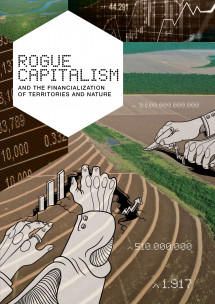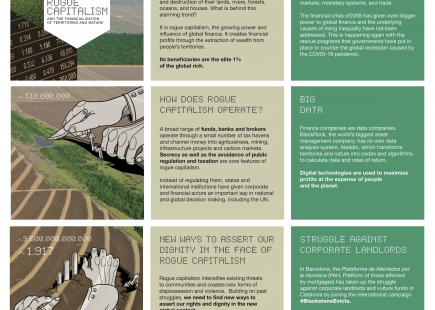Rogue Capitalism and the financialization of territories and nature
Topics
This discussion paper explores the process known as “financialization”. It intends to provide a basis for people’s movements, grassroots activists and other civil society organizations (CSOs) to build or strengthen their knowledge and to develop strategies to resist, reverse and prevent financialization.


This paper is based on the experiences and analyses of member organizations of the IPC Land and Territory Working Group, and intends to stimulate collective reflection and discussion among all interested organizations about how to oppose the increasing power, influence and control of global finance over our territories. Rather than providing a theoretical reflection or an in-depth analysis of all aspects of financialization, the paper aims to help grassroots organizations to understand its key components/aspects and its implications for people and communities around the world. The paper sheds light on different ways in which finance capital manifests itself in people’s territories, and the actors, places, institutions and policies, that drive these processes forward. The different chapters and the document itself conclude with a set of questions to guide further reflection and discussion.
This paper has been developed by members of the IPC Land and Territory Working Group, which has defined the financialization of land and nature as a common and critical challenge that its member organizations face.
We believe that it is essential for our struggles for food and people’s sovereignty to understand these new dynamics and mechanisms at play. Communities and people around the world are directly affected by financialization. The violent impacts are visible, but we need to understand the underlying drivers in order to be effective in our struggles. Therefore, we hope that this paper can serve as a starting point for an action-oriented reflection that allows us to further develop our political agenda, and to refine our strategies and ways of organizing in order to stop and roll back the privatization and commodification of nature and life.
The process of developing this document was completed before the COVID-19 pandemic spread across the world in early 2020. This pandemic has exposed the devastating consequences of contemporary capitalism. Resource grabs and ecosystem destruction have created the conditions for the emergence of new pathogens. At the same time, the financialization of health systems and other public services has reduced the capacity of societies to respond to the spread of the novel Coronavirus, creating a profound health crisis. All over the world, people and communities who have been dispossessed and marginalized over the last decades have been particularly affected by the pandemic.
COVID-19 has also deepened the crisis of capitalism. Lockdowns that have been imposed by a large number of governments, as well as the abrupt halting of many economic activities, have temporarily suspended capitalism. Financial markets plunged at the beginning of the pandemic, prompting government interventions to stabilize them. The world is entering a global recession, which will have severe impacts on rural and urban people and communities around the world. In response, governments have put in place rescue packages, raising fears that big business and global finance will again be rescued and bailed out with tax money, as happened during the 2008/09 world financial crisis.
While there is a real risk that the crisis will further consolidate the power of big business and global finance, the way in which the pandemic has exposed the flaws of the current system may also be an opportunity to achieve real change. In this sense, this paper is also a contribution to a debate on the most strategic entry points for shaping the post-COVID-19 world in a way that places people, communities and their rights at the center.
